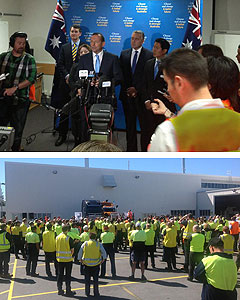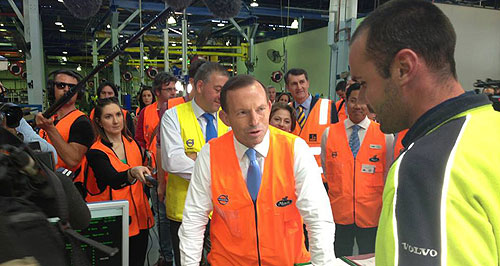Make / Model Search
News - General News - GovernmentAbbott aims to eliminate auto industry handoutsBig rig: Tony Abbott launches Coalition’s manufacturing policy at Volvo Group Australia’s Wacol truck assembly plant in Brisbane. Coalition leader uses local truck factory as example of subsidy-free auto industry23 Aug 2013 By TERRY MARTIN FEDERAL opposition leader Tony Abbott this week revealed in no uncertain terms his desire for Australia’s automotive industry to operate without government assistance. Releasing the Coalition’s manufacturing policy at Volvo Group Australia’s factory in Brisbane on Wednesday, Mr Abbott highlighted the trucking group’s operations – which include building Mack and Volvo trucks at the Wacol assembly plant – as proof that vehicle manufacturers could be profitable without government subsidies. When asked whether he was prepared to let Holden and Toyota follow Ford in closing down their car-making operations in Australia, Mr Abbott said he would “cross those bridges if and when we get there”. He added that he was happy to “talk through things” with Holden, whose manufacturing future hinges on the outcome of negotiations with the winner of the September 7 federal election, but declared he was only interested in having “an adult discussion” based on the value the nation would receive in return for more taxpayer funding. “I’m very pleased to be here at Volvo today because this is proof that we can make things, make sophisticated things in this country without a government subsidy,” Mr Abbott said. “We can make sophisticated things in this country without a government subsidy and do so profitably and export from this plant. “This plant proves that you do not need to write blank cheques for businesses in order to have a strong and dynamic manufacturing sector in this country. “If we get the economic fundamentals right, then we give our businesses generally including our manufacturers the best opportunity to invest, to employ, to compete, to innovate and to succeed. “So that’s why at the core of our policy for manufacturing industry is to abolish the carbon tax, abolish the mining tax, get the workplace relations pendulum back to the sensible centre, to cut red tape and generally work with the businesses of Australia rather than against them,” he said. As previously reported, Mr Abbott has pledged to cut $500 million from the Automotive Transformation Scheme if elected, and to “immediately proceed” with a Productivity Commission review of the car industry “in order to ensure there is again a sensible, evidence-based approach to taxpayer-funded subsidies as well as better funding benchmarks aimed at the long-term viability of the industry”. Asked specifically this week whether he would be prepared to let Holden and Toyota close down their manufacturing operations in Australia, as Ford has announced it will do from 2016, Mr Abbott said: “Let’s cross those bridges if and when we get there, but this plan here is an example of a sophisticated plan in the motor manufacturing industry that does not require government handouts. “It is possible to do sophisticated motor manufacturing in this country without a government handout. Volvo and Kenworth down in Melbourne prove that. “Now, let’s talk about the car-making industry for a moment. I want to see car-making survive in this country, not just survive but flourish. I want to do what I can to make it flourish. “We’ll get rid of the carbon tax obviously that will reduce the cost of producing a car here in Australia by an estimated $400 a vehicle. We will make various changes to the regulatory environment which will help as well, but we will maintain a strong program of assistance to the car industry. “What we aren’t going to do is what Mr Rudd has done over the last few weeks and basically run down the road after Holden waiving a blank cheque at them. Now, we’re just not going to do that because that’s not a sensible way for an adult government to behave. “We’re happy to sit down with them. If they want to sit down with us to talk through things and from our point of view, we’ll say we need to get value for taxpayers’ dollar and that means doing what you reasonably can to be as competitive as you possibly can be and doing what you should to ensure that the volumes of your plants move up and that means an export program.  Left: Opposition leader Tony Abbott addresses Volvo workers in Brisbane. Left: Opposition leader Tony Abbott addresses Volvo workers in Brisbane.“Toyota have got a strong export program. Holden have certainly moved in that direction. Unfortunately, Ford never really did and that’s one of the reasons why Ford are now on the way out of manufacturing in this country.” Holden is waiting until after the election to resume negotiations with the federal government over its future as a car manufacturer in Australia. Asked whether he was prepared to risk Holden’s future based on his comments that “we’ll cross that bridge when we come to it”, Mr Abbott said “we want Holden to survive”. “We have a good record when it comes to working with the car manufacturers to help them, not just to survive, but to flourish and we will act in that same spirit in the future,” he said. And responding to a question about the long-term ramifications for the nation if companies like Holden and Toyota close their factories, Mr Abbott said: “Obviously it would be a pity and we don’t want to see it – we really don’t want to see it, but no adult prime minister in the heat of an election campaign, in panic over polls, charges down the street waving a blank cheque after anyone. “You just don’t do that. So, if the motor manufacturers want to come to us after the election, obviously they can and we will sit down and we will have an adult discussion with them about trying to ensure that those industries have a strong future, because that’s what all of us want.” Shadow industry minister Sophie Mirabella added that “it’s not just about the amount of money it is about ensuring that the rules and benchmarks for funding the car sector are sustainable and aimed at long-term viability of the sector”. In his manufacturing policy released this week, Mr Abbott vowed to: appoint a minister for trade and investment “whose central responsibility will be to attract trade and increase inwards investment into Australia” build Australia’s manufacturing export base by progressively restoring funding to ‘Export Market Development Grants’ starting with an initial $50 million boost establish a $50 million ‘Manufacturing Transition Fund’ designed “to provide assistance to communities and industries as they transition to new areas of manufacturing growth” and implement industry-specific ‘Strategic Growth Action Agendas’ that bring industry and government together “to develop strategic, co-ordinated and long-term plans for growth and viability”. Prime minister Kevin Rudd announced last weekend that the government would tip an extra $500 million into Australia’s automotive industry if returned after another election due in 2016, with commitments of $300 million a year from 2020. Earlier this month, Labor pledged another $200 million in unspecified funding to help boost sales of Australian-made vehicles. This came after widespread criticism from the industry after the government announced proposed changes to fringe benefits tax rules, which would remove the 20 per cent statutory formula method for salary-sacrificed and employer-provided vehicles. This is designed to save taxpayers up to $1.8 billion, helping pay for the government’s early move to an emissions trading scheme, but in recent weeks has seen a large number of jobs axed in the industry and scores of vehicle orders cancelled. “The choice for anyone who cares about the future of the Australian-made car and Australian manufacturing jobs is clear,” Mr Rudd said at the announcement of Labor’s new policy on August 17, surrounded by Holden workers and union members at the Salisbury North Community Club in Adelaide. “Under Federal Labor’s ‘New Car Plan for the 2020s’, the automotive industry will make a vital contribution to our economy after the China resources boom. It will make 250,000 direct and indirect jobs more secure. “Under the Coalition’s cuts, the Australian-made car will be relegated to the history books and 250,000 Australian jobs will be at risk, with 50,000 certain to go. “The New Car Plan for the 2020s will be funded from within the existing funding allocation and no new funds will be required for the program until 2018.”  Read more22nd of August 2013  Coalition targets younger drivers in roads policyAbbott aims to reduce road trauma via $2.2b funding, $10m for young driver scheme19th of August 2013  Industry lukewarm on Labor’s $2bn support packagePromise of big post-2016 fund injection fails to get car industry fired up19th of August 2013  Falcon had to go, says Ford global chiefMulally loved the Falcon, but large-car customers have moved on16th of August 2013  Holden workers back survival planAustralian car-making still on shaky ground despite Holden workers backing cuts9th of August 2013  Shape our future to 2025, car industry expert saysDeloitte partner says car-parts makers need to take control of their own future8th of August 2013  Exclusive: Coalition could crush car industry: expertIndustry adviser Goran Roos rejects Coalition’s PC review plan, flags niche future |
Click to shareGeneral News articlesResearch General News Motor industry news |











Facebook Twitter Instagram